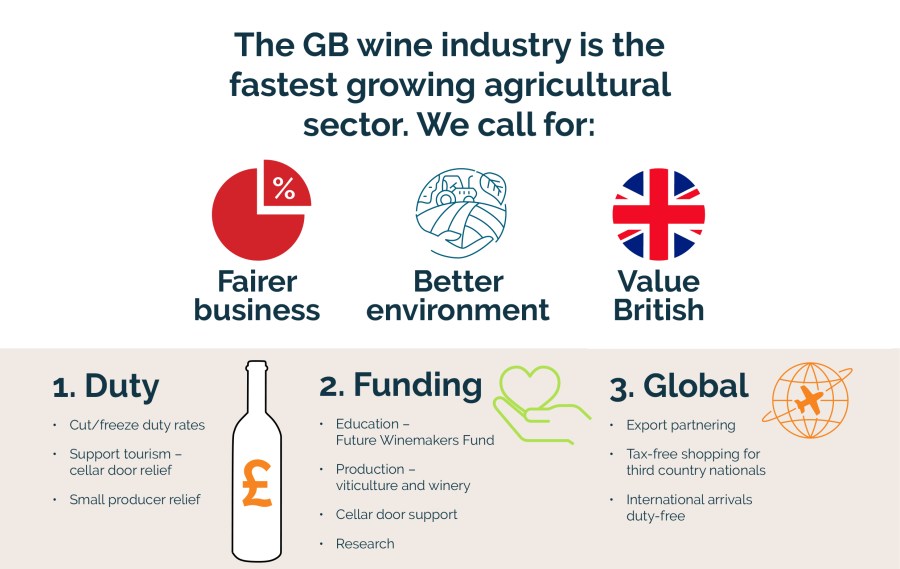Last month, we sent in our second Budget submission of the year and wrote to the Chancellor of the Exchequer, Rt Hon Rachel Reeves MP.
As the UK’s fastest growing agricultural sector, we called for:
Duty reform and fairer business
- A fairer tax regime for British wine including a duty reduction/freeze.
The UK is one of the few wine-producing countries in Europe that levies excise on home-grown and produced products. 10 European countries apply no excise duty on domestically produced sparkling wines (France only applied a rate of €0.07 in 2022), while 15 applied no excise duty on domestically produced still wines (France applied rate of €0.03). This is the reality of what English and Welsh wine competes with both domestically and internationally.
Reducing duty on wine would help stimulate sales, which in turn could deliver a knock-on increase in collected excise duty. - Support for wine tourism in the form of Cellar Door Relief, supporting 300 businesses to grow their tourism offerings.
A quarter of winery income on average comes from wine tourism in the UK. According to the 2021 South Downs National Park report, viticulture has a 13 times higher gross value add to the economy compared to traditional cereal crops.
A Cellar Door Relief Scheme would allow producers to claim relief on sales of up to 13,350 bottles from their cellar door. Such a scheme would support local tourism and community spaces, provide additional job opportunities, and boost sales, leading to increased revenue for the Treasury. - Extension of Small Producer Relief to level the playing field and ensure English and Welsh wine producers – as well as small brewers and cider-makers – can access this support.
As it stands, wine is excluded from SPR due to the 8.5% ABV threshold imposed. The International Organisation of Vine and Wine (OIV), of which the UK Government is a member, states that wine cannot be made under 8.5% and still be called wine.
We propose that SPR be adjusted so that it has alcohol category specific thresholds which would enable domestic wine producers to avail of it by producing products to the lower end of the recognised wine ABV scale i.e. 10.5% to 11.5% ABV.
Increased funding
- Backing for education by making the Future Winemakers’ Scheme a permanent, annual funding stream.
Making this Scheme, announced in April, an annual initiative would boost education and expertise within our industry and reduce dependence on overseas talent. - Enhanced grants for both vineyard and winery related equipment, allowing for improved productivity and sector-wide investment.
We propose that future iterations of the Farming Equipment and Technology Fund include more viticulture-specific equipment, while grants should also be given for production-related machinery and infrastructure. This would address the potential lack of production facilities (221 wineries, compared to 1,030 vineyards) in the face of increased harvest volumes. - Cellar door support by enhancing local infrastructure to facilitate travel and communication.
Improved physical infrastructure (transport links, energy, water, wifi etc.) would support the growth of both our sector and the wider rural economy. - Further aid for wine-specific research to help us face challenges brought about by climate change.
Further support for winemaking-specific research is required so we can help our industry mitigate the effects of variable weather patterns and develop new techniques to process different. grape varieties.
Global impact
- Export support and partnerships to increase market penetration overseas. Only with substantial UK Government assistance, working in partnership with our sector to open doors, will this be possible.
Exports of English and Welsh wine have doubled in two years (4% in 2021 to 8% of total sales in 2023). For new and emerging businesses, the export market can be challenging, and our industry requires the active support of the UK government through programmes such as the UK Embassy network as well as grant and export financing.
No alcoholic beverage category and no new wine region has established itself internationally in the last 50 years without such assistance. - Restoration of tax-free shopping for international visitors to the UK.
By making this change, it would expose UK wine producers to an expanded customer base. Such a measure has the potential to create a £10 billion, shopping-led tourism market for Britain as well as generating a positive economic impact for regions outside of Greater London. - Introduction of arrivals duty-free at UK ports and airports to provide travel incentives.
Over 60 countries world-wide allow arrivals duty-free, including Norway and Switzerland. Arrivals duty-free relocates passenger spending from the point of departure to the point of arrival. It would benefit UK producers, given the importance of selling locally produced products, in particular in regional airports and the UK’s ports.




